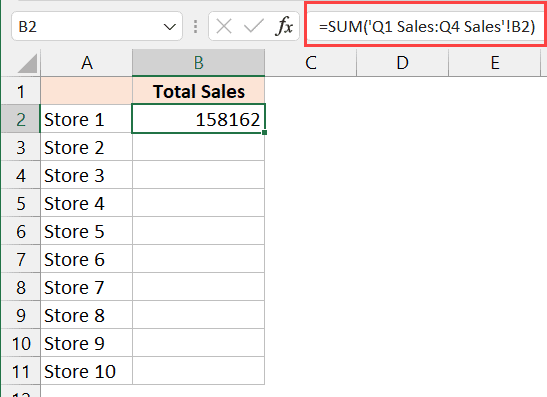5 Easy Ways to Sum Excel Cells Across Sheets

When working with large datasets in Microsoft Excel, consolidating data from multiple sheets into a single summary can be crucial. Whether you're a financial analyst tracking different portfolios or a project manager consolidating team reports, Excel offers several techniques to sum data across sheets. Here are five straightforward methods to streamline your workflow:
Method 1: Using 3-D References

3-D references in Excel allow you to perform calculations across multiple sheets efficiently. Here’s how:
- Click on the cell where you want the sum to appear.
- Start your formula with
=SUM( - Click on the first sheet tab, then while holding the Shift key, click on the last tab you want to include in the calculation.
- Select the range of cells to sum across these sheets.
- Finish the formula with
).
For example, if you’re summing cell A1 from Sheet1 to Sheet5, your formula would look like:
=SUM(Sheet1:Sheet5!A1)
⚠️ Note: Ensure that the cell references are consistent across all sheets to get accurate results.
Method 2: Consolidate Feature

Excel’s Consolidate feature allows you to combine data from various sheets:
- Navigate to the ‘Data’ tab.
- Select ‘Consolidate’.
- Choose ‘Sum’ as the function.
- In the Reference box, select your range from the first sheet and add it.
- Repeat for each sheet, making sure to check ‘Create links to source data’ if you want to update automatically.
💡 Note: This method is ideal for dynamic data that might change often, allowing for automatic updates.
Method 3: Power Query

If you’re dealing with a complex dataset, Power Query can help:
- From the ‘Data’ tab, click ‘Get Data’, then ‘From Other Sources’, and choose ‘Blank Query’.
- In the Query Editor, click ‘Advanced Editor’ and write a formula to combine data from multiple sheets:
let
Source = Table.Combine({Excel.CurrentWorkbook(){[Name=“Sheet1”]}[Content], Excel.CurrentWorkbook(){[Name=“Sheet2”]}[Content], Excel.CurrentWorkbook(){[Name=“Sheet3”]}[Content]})
in
Source
- Load the result into Excel and sum as needed.
🔍 Note: Power Query requires some knowledge of Excel's formula language but offers tremendous flexibility.
Method 4: Excel Macros

For repetitive tasks, you might want to automate using VBA Macros:
- Open the VBA editor with Alt + F11.
- Insert a new module and enter the following code:
Sub SumCellsAcrossSheets()
Dim ws As Worksheet, lastRow As Long, sum As Double
sum = 0
For Each ws In ThisWorkbook.Worksheets
If ws.Name <> “Summary” Then
lastRow = ws.Cells(ws.Rows.Count, “A”).End(xlUp).Row
sum = sum + Application.Sum(ws.Range(“A1:A” & lastRow))
End If
Next ws
Sheets(“Summary”).Range(“A1”).Value = sum
End Sub
- Run the macro to sum values from each sheet into a summary sheet.
🤖 Note: Macros can significantly reduce manual work but require basic programming knowledge.
Method 5: SUMIF with Named Ranges

If your sheets follow a certain pattern or you’re looking for conditional sums, use SUMIF with named ranges:
- Create named ranges for each sheet you want to sum from.
- Use the SUMIF function like so:
=SUMIF(NamedRange1, Criteria, NamedRange1) + SUMIF(NamedRange2, Criteria, NamedRange2) + SUMIF(NamedRange3, Criteria, NamedRange3)
- This formula sums values across sheets based on a specific criterion.
🔔 Note: This method is particularly useful for conditional data analysis across multiple sheets.
Summing cells across sheets in Excel can be done in various ways, from basic 3-D references to advanced Power Query techniques. Choosing the right method depends on the complexity of your data, your familiarity with Excel, and whether the data changes frequently. By implementing these methods, you can transform Excel into a powerful tool for data consolidation, making your analysis tasks much simpler and more efficient.
What is the advantage of using 3-D references?

+
3-D references allow you to perform calculations across multiple sheets with a single formula, reducing the need to manually add each sheet’s data.
How does Excel’s Consolidate feature update automatically?

+
By checking ‘Create links to source data’, Excel will automatically update the consolidated data whenever changes are made to the source sheets.
Is it necessary to know VBA to use Excel Macros?

+
While basic programming knowledge is helpful, many Macros can be recorded and edited without extensive VBA coding skills.



